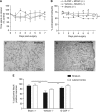G-CSF administration is neuroprotective following transient cerebral ischemia even in the absence of a functional NOS-2 gene - PubMed (original) (raw)
G-CSF administration is neuroprotective following transient cerebral ischemia even in the absence of a functional NOS-2 gene
Claire L Gibson et al. J Cereb Blood Flow Metab. 2010 Apr.
Abstract
Granulocyte colony-stimulating factor (G-CSF) is a candidate neuroprotective factor following cerebral ischemia. To determine whether G-CSF acts partly through the inhibition of nitric oxide synthase (NOS)-2 expression, we administered G-CSF to male NOS-2-/- mice after cerebral ischemia. Although male NOS-2-/- mice exhibit resistance to the gross effects of cerebral ischemia, they display neuronal loss and skilled motor deficits following cerebral ischemia. Administration of G-CSF during reperfusion reduced motor deficit and neuronal loss. Thus, G-CSF is still effective in NOS-2 gene-deficient mice, suggesting that part of the mechanism of action is independent of NOS-2.
Figures
Figure 1
(A) Assessment of rotarod performance showed that after middle cerebral artery occlusion (MCAO), _NOS-2_−/− mice that received granulocyte colony-stimulating factor (G-CSF) or vehicle were indistinguishable from shams. The data are expressed as the percentage (%) of mean duration per day compared with the presurgery control value. (B) Skilled motor performance assessed using the grid test showed that unilateral deficits, measured by the number of contralateral foot faults (expressed as the % of total errors made), were significantly higher in _NOS-2_−/− mice after MCAO compared with shams, ***P<0.0001. # represents a significant difference from sham animals on the day of testing. Treatment with G-CSF significantly reduced this deficit, *P<0.05. After sham surgery, no unilateral functional deficit was observed. (C, D) Neuronal nuclei (NeuN)-positive neurons were identified in the striatal areas and the lateral cortex. (E) Cell counts of NeuN-positive neurons showed that NOS-2−/− mice exhibited neuronal loss 7 days after MCAO (***P<0.001) which was significantly reduced after G-CSF treatment (**P<0.01).
Similar articles
- Reduction in programmed cell death and improvement in functional outcome of transient focal cerebral ischemia after administration of granulocyte-macrophage colony-stimulating factor in rats. Laboratory investigation.
Kong T, Choi JK, Park H, Choi BH, Snyder BJ, Bukhari S, Kim NK, Huang X, Park SR, Park HC, Ha Y. Kong T, et al. J Neurosurg. 2009 Jul;111(1):155-63. doi: 10.3171/2008.12.JNS08172. J Neurosurg. 2009. PMID: 19361262 - Neuroprotective effect of granulocyte colony-stimulating factor after focal cerebral ischemia.
Schäbitz WR, Kollmar R, Schwaninger M, Juettler E, Bardutzky J, Schölzke MN, Sommer C, Schwab S. Schäbitz WR, et al. Stroke. 2003 Mar;34(3):745-51. doi: 10.1161/01.STR.0000057814.70180.17. Epub 2003 Feb 13. Stroke. 2003. PMID: 12624302 - Neuroprotective effect of recombinant human granulocyte colony-stimulating factor in transient focal ischemia of mice.
Komine-Kobayashi M, Zhang N, Liu M, Tanaka R, Hara H, Osaka A, Mochizuki H, Mizuno Y, Urabe T. Komine-Kobayashi M, et al. J Cereb Blood Flow Metab. 2006 Mar;26(3):402-13. doi: 10.1038/sj.jcbfm.9600195. J Cereb Blood Flow Metab. 2006. PMID: 16049425 - G-CSF reduces infarct volume and improves functional outcome after transient focal cerebral ischemia in mice.
Gibson CL, Bath PM, Murphy SP. Gibson CL, et al. J Cereb Blood Flow Metab. 2005 Apr;25(4):431-9. doi: 10.1038/sj.jcbfm.9600033. J Cereb Blood Flow Metab. 2005. PMID: 15660101 - Intranasal Delivery of Granulocyte Colony-Stimulating Factor Enhances Its Neuroprotective Effects Against Ischemic Brain Injury in Rats.
Sun BL, He MQ, Han XY, Sun JY, Yang MF, Yuan H, Fan CD, Zhang S, Mao LL, Li DW, Zhang ZY, Zheng CB, Yang XY, Li YV, Stetler RA, Chen J, Zhang F. Sun BL, et al. Mol Neurobiol. 2016 Jan;53(1):320-330. doi: 10.1007/s12035-014-8984-2. Epub 2014 Nov 29. Mol Neurobiol. 2016. PMID: 25432887
Cited by
- Monocyte chemoattractant protein-1-deficiency impairs the expression of IL-6, IL-1β and G-CSF after transient focal ischemia in mice.
Strecker JK, Minnerup J, Gess B, Ringelstein EB, Schäbitz WR, Schilling M. Strecker JK, et al. PLoS One. 2011;6(10):e25863. doi: 10.1371/journal.pone.0025863. Epub 2011 Oct 21. PLoS One. 2011. PMID: 22031820 Free PMC article. - Ferulic acid ameliorates nerve injury induced by cerebral ischemia in rats.
Zhang L, Wang H, Wang T, Jiang N, Yu P, Chong Y, Fu F. Zhang L, et al. Exp Ther Med. 2015 Mar;9(3):972-976. doi: 10.3892/etm.2014.2157. Epub 2014 Dec 24. Exp Ther Med. 2015. PMID: 25667662 Free PMC article. - Stem cell therapy for cerebral ischemia: from basic science to clinical applications.
Abe K, Yamashita T, Takizawa S, Kuroda S, Kinouchi H, Kawahara N. Abe K, et al. J Cereb Blood Flow Metab. 2012 Jul;32(7):1317-31. doi: 10.1038/jcbfm.2011.187. Epub 2012 Jan 18. J Cereb Blood Flow Metab. 2012. PMID: 22252239 Free PMC article. Review.
References
- Gibson CL, Bath PMW, Murphy SP. G-CSF reduces infarct volume and improves functional outcome after transient focal cerebral ischemia in mice. J Cereb Blood Flow Metab. 2005a;25:431–439. - PubMed
- Gibson CL, Jones NC, Prior MJW, Bath PMW, Murphy DP. G-CSF suppresses edema formation and reduces interleukin-1β expression after cerebral ischemia in mice. J Neuropath Exp Neurol. 2005b;64:1–7. - PubMed
- Jones NC, Constantin D, Gibson CL, Prior MJW, Morris PG, Marsden CA, Murphy SP. A detrimental role for nitric oxide synthase-2 in the pathology resulting from acute cerebral injury. J Neuropath Exp Neurol. 2004;63:708–720. - PubMed
- Komine-Kobayashi M, Zhang N, Liu M, Tanaka R, Hara H, Osaka A, Mochizuki H, Mizuno Y, Urabe T. Neuroprotective effect of recombinant human granulocyte-colony stimulating factor in transient focal ischemia of mice. J Cereb Blood Flow Metab. 2006;26:402–413. - PubMed
Publication types
MeSH terms
Substances
LinkOut - more resources
Full Text Sources
Medical
